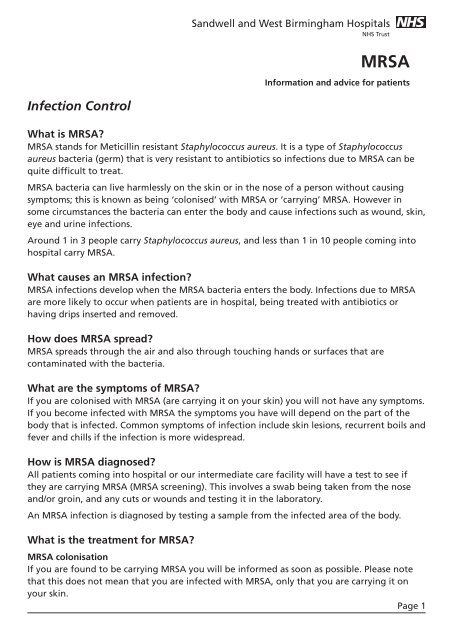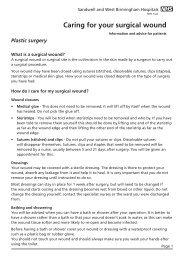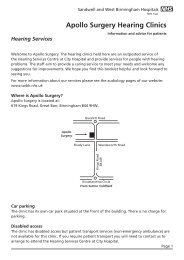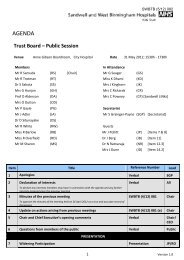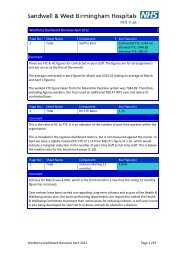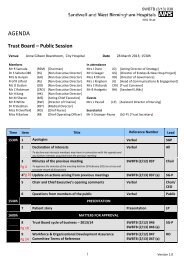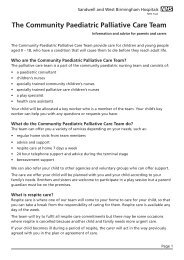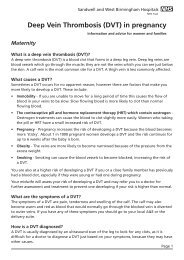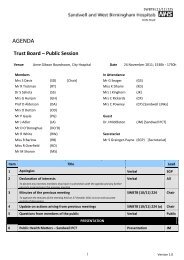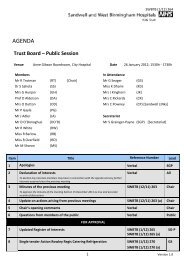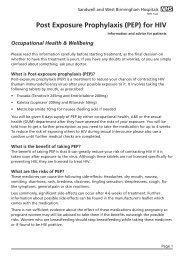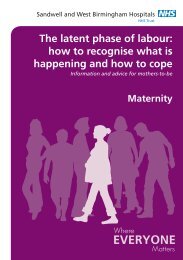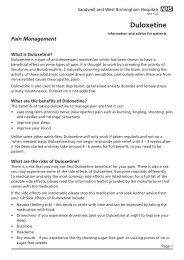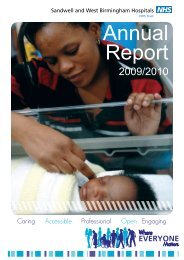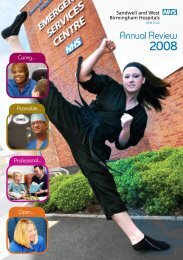MRSA - Sandwell & West Birmingham Hospitals
MRSA - Sandwell & West Birmingham Hospitals
MRSA - Sandwell & West Birmingham Hospitals
You also want an ePaper? Increase the reach of your titles
YUMPU automatically turns print PDFs into web optimized ePapers that Google loves.
<strong>MRSA</strong><br />
Information and advice for patients<br />
Infection Control<br />
What is <strong>MRSA</strong>?<br />
<strong>MRSA</strong> stands for Meticillin resistant Staphylococcus aureus. It is a type of Staphylococcus<br />
aureus bacteria (germ) that is very resistant to antibiotics so infections due to <strong>MRSA</strong> can be<br />
quite difficult to treat.<br />
<strong>MRSA</strong> bacteria can live harmlessly on the skin or in the nose of a person without causing<br />
symptoms; this is known as being ‘colonised’ with <strong>MRSA</strong> or ‘carrying’ <strong>MRSA</strong>. However in<br />
some circumstances the bacteria can enter the body and cause infections such as wound, skin,<br />
eye and urine infections.<br />
Around 1 in 3 people carry Staphylococcus aureus, and less than 1 in 10 people coming into<br />
hospital carry <strong>MRSA</strong>.<br />
What causes an <strong>MRSA</strong> infection?<br />
<strong>MRSA</strong> infections develop when the <strong>MRSA</strong> bacteria enters the body. Infections due to <strong>MRSA</strong><br />
are more likely to occur when patients are in hospital, being treated with antibiotics or<br />
having drips inserted and removed.<br />
How does <strong>MRSA</strong> spread?<br />
<strong>MRSA</strong> spreads through the air and also through touching hands or surfaces that are<br />
contaminated with the bacteria.<br />
What are the symptoms of <strong>MRSA</strong>?<br />
If you are colonised with <strong>MRSA</strong> (are carrying it on your skin) you will not have any symptoms.<br />
If you become infected with <strong>MRSA</strong> the symptoms you have will depend on the part of the<br />
body that is infected. Common symptoms of infection include skin lesions, recurrent boils and<br />
fever and chills if the infection is more widespread.<br />
How is <strong>MRSA</strong> diagnosed?<br />
All patients coming into hospital or our intermediate care facility will have a test to see if<br />
they are carrying <strong>MRSA</strong> (<strong>MRSA</strong> screening). This involves a swab being taken from the nose<br />
and/or groin, and any cuts or wounds and testing it in the laboratory.<br />
An <strong>MRSA</strong> infection is diagnosed by testing a sample from the infected area of the body.<br />
What is the treatment for <strong>MRSA</strong>?<br />
<strong>MRSA</strong> colonisation<br />
If you are found to be carrying <strong>MRSA</strong> you will be informed as soon as possible. Please note<br />
that this does not mean that you are infected with <strong>MRSA</strong>, only that you are carrying it on<br />
your skin.<br />
Page 1
<strong>MRSA</strong><br />
Information and advice for patients<br />
Infection Control<br />
The treatment will involve applying an ointment to the inside of your nose, and showering<br />
and shampooing your hair with an antiseptic soap. You will be given full instructions on how<br />
and when to use these.<br />
<strong>MRSA</strong> infection<br />
If you have an <strong>MRSA</strong> infection you will need a course of antibiotics, and will also need the<br />
same treatment for <strong>MRSA</strong> carriage as above.<br />
If you are found to be carrying <strong>MRSA</strong> or you have an <strong>MRSA</strong> infection you may be nursed in a<br />
single room or in a ward or part of a ward together with other patients who have <strong>MRSA</strong>.<br />
What are the benefits of treatment?<br />
<strong>MRSA</strong> colonisation<br />
The benefit of this treatment is that it will reduce the risk of you developing an <strong>MRSA</strong><br />
infection and transmitting it to others.<br />
<strong>MRSA</strong> infection<br />
The benefit of treating <strong>MRSA</strong> infection is that it will help to prevent further complications. It<br />
is vital that you complete your course of antibiotics even if you are feeling better.<br />
What are the risks of treatment?<br />
<strong>MRSA</strong> colonisation<br />
Your skin could become irritated by the washes if you are allergic to the ingredients and<br />
could become dry, red, sore and/or cracked. If this happens please stop using it and tell the<br />
person looking after you (if you are in hospital) or your GP (if you have been discharged).<br />
<strong>MRSA</strong> infection<br />
The most common side effect of antibiotics is an upset stomach, nausea (feeling sick) and<br />
diarrhoea. If you have an allergy to any antibiotics please let your doctor know before<br />
starting.<br />
What are the risks of not having treatment?<br />
<strong>MRSA</strong> colonisation<br />
If you do not complete your treatment there is a small risk of developing an infection and<br />
transmitting the bacteria to others.<br />
<strong>MRSA</strong> infection<br />
Not having treatment may mean that your infection gets worse and may become a lot more<br />
severe.<br />
Page 2
<strong>MRSA</strong><br />
Information and advice for patients<br />
Infection Control<br />
Are there alternative treatments?<br />
<strong>MRSA</strong> colonisation<br />
There are alternative products available to reduce <strong>MRSA</strong> carriage however, <strong>Sandwell</strong><br />
and <strong>West</strong> <strong>Birmingham</strong> <strong>Hospitals</strong> NHS Trust uses the treatments nationally recognised and<br />
scientifically proven to be effective. These alternatives can be used if you are allergic to the<br />
products routinely used.<br />
Treatment with antibiotics is also available and your doctor/nurse will advise you if this is<br />
appropriate for you.<br />
<strong>MRSA</strong> infection<br />
There are no alternative treatments for <strong>MRSA</strong> infection; the only proven treatment is<br />
antibiotics.<br />
What happens when I am ready to leave hospital?<br />
Having <strong>MRSA</strong> should not delay your discharge from hospital once you are well. If a district<br />
nurse/midwife is visiting you, s/he will be told that you may still have <strong>MRSA</strong> and may wear<br />
aprons and gloves. Once you get home there will be no need for any special precautions.<br />
If you develop a wound infection or become unwell after you have been discharged please<br />
see your GP or practice nurse.<br />
If you will be coming back to hospital in the near future for an invasive procedure or<br />
operation you may be given some antibacterial washes to use.<br />
How long will I carry <strong>MRSA</strong> for?<br />
Some people may carry the germ for long periods of time whilst others may no longer carry<br />
it after they have received treatment.<br />
If you develop an infection your doctor will know you have carried <strong>MRSA</strong> in the past and will<br />
be able to prescribe the correct antibiotics without delay, but will not mind if you remind<br />
them.<br />
If you are admitted to hospital in the future you should always tell the doctors and nurses<br />
that you have had <strong>MRSA</strong> in the past.<br />
Are my relatives at risk of catching the germ from me?<br />
The <strong>MRSA</strong> bacterium is not a problem for healthy people and there is no reason why your<br />
relatives and friends should keep away from you. However they should cover any cuts with<br />
waterproof plasters and should wash their hands after visiting you. This is to prevent <strong>MRSA</strong><br />
from spreading. They only need to wear gloves and plastic aprons if they are helping with<br />
your care whilst you are in the hospital.<br />
Page 3
<strong>MRSA</strong><br />
Information and advice for patients<br />
Infection Control<br />
Should I stay away from work/school?<br />
You do not have to stay off work/school if you are colonised with <strong>MRSA</strong>. If you have an<br />
infection your doctor might advise you stay off if you are unwell. If you are unsure please<br />
speak to your GP who will know your clinical history.<br />
If you are a healthcare worker you should inform your Occupational Health Department.<br />
Can <strong>MRSA</strong> be prevented?<br />
The spread of <strong>MRSA</strong> can be prevented by regular cleaning, good hand hygiene and by<br />
following the hospital infection control guidelines which can be found in the leaflet ‘Helping<br />
us to reduce the risk of cross infection’.<br />
Screening for <strong>MRSA</strong> when coming into hospital helps to identify patients who are carrying<br />
the <strong>MRSA</strong> bacterium so they can be treated to prevent them developing an infection or<br />
passing the bacterium to other patients.<br />
Contact details<br />
If you have any questions or concerns please speak to the doctor looking after you, your GP<br />
or the hospital or community infection control nurses:<br />
Hospital Infection Control Service<br />
0121 554 3801 (ask for Infection Control Service)<br />
Community Infection Control Nurse<br />
0121 612 2903<br />
Further Information<br />
NHS Choices<br />
www.nhs.uk/conditions/mrsa<br />
NHS Direct<br />
For health information and reassurance:<br />
www.nhsdirect.nhs.uk<br />
24 hour helpline: 0845 46 47<br />
For more information about our hospitals and services please see our website:<br />
<strong>Sandwell</strong> and <strong>West</strong> <strong>Birmingham</strong> <strong>Hospitals</strong> NHS Trust<br />
www.swbh.nhs.uk<br />
Page 4
<strong>MRSA</strong><br />
Information and advice for patients<br />
Infection Control<br />
Further Infection Control information leaflets can be found on our website, or you can ask a<br />
member of staff for a copy. You may find the following leaflets useful:<br />
• Helping us to reduce the risk of cross infection<br />
• <strong>MRSA</strong> Screening (elective patients)<br />
• <strong>MRSA</strong> Screening (emergency patients)<br />
Sources used for the information in this leaflet<br />
• The Journal of Hospital Infection, ‘Guidelines for the control and prevention of<br />
methicillin-resistant Staphylococcus Aureus (<strong>MRSA</strong>) in healthcare facilities’, 2006<br />
• The Journal of Hospital Infection, ‘A systematic review of the evidence for interventions<br />
for the prevention and control of methicillin-resistant Staphylococcus Aureus’, 2006<br />
• The Journal of Antimicrobial Chemotherapy, ‘Guidelines for the prophylaxis and<br />
treatment of methicillin-resistant Staphylococcus Aureus infections in the UK’, 2006<br />
• Clinical Infectious Diseases Journal, ‘Randomized controlled trial of chlorhexidine<br />
gluconate for washing, intranasal mupirocin, and rifampicin and doxycycline versus no<br />
treatment for the eradication of methicillin-resistant Staphylococcus aureus colonization’,<br />
2007<br />
• The Cochrance Library, ‘Antimicrobial drugs for treating methicillin-resistant<br />
Staphylococcus aureus colonization (Review)’, 2004<br />
• British National Formulary 62, section 13: ‘Skin cleansers, antiseptics, and desloughing<br />
agents: Chlorhexidine’, 2011<br />
If you would like to suggest any amendments or improvements to this leaflet please contact the<br />
communications department on 0121 507 5420 or email: swb-tr.swbh-gm-patient-information@nhs.net<br />
A Teaching Trust of The University of <strong>Birmingham</strong><br />
Incorporating City, <strong>Sandwell</strong> and Rowley Regis <strong>Hospitals</strong><br />
© <strong>Sandwell</strong> and <strong>West</strong> <strong>Birmingham</strong> <strong>Hospitals</strong> NHS Trust<br />
ML3449<br />
Issue Date: January 2012<br />
Review Date: January 2014<br />
Page 5


